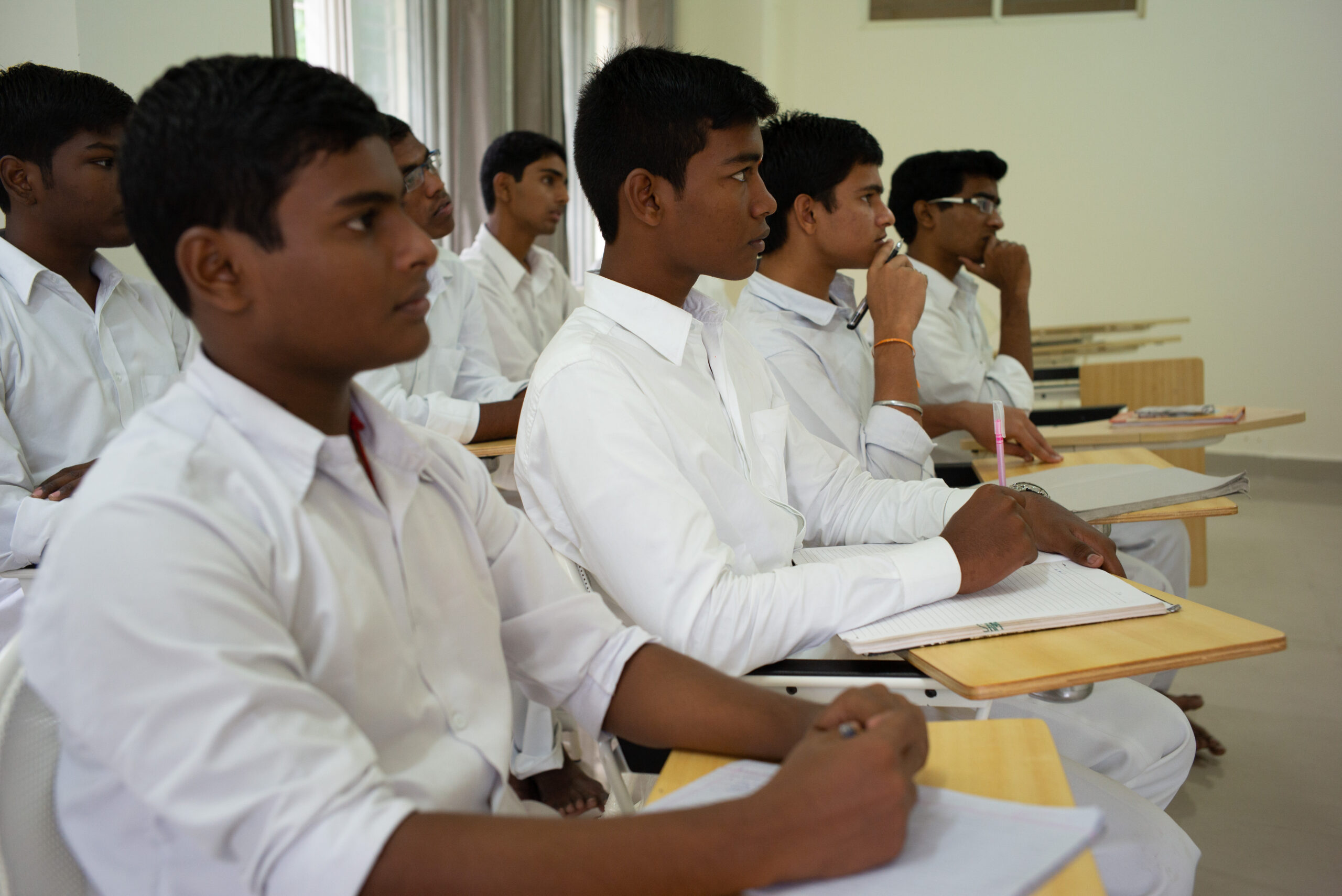Undergraduate Programme
For Women & Men

Duration: 4 Years
Economics examines the decision-making processes of consumers, firms, and governments, which collectively influence resource allocation. Pursuing an undergraduate degree in economics is crucial for understanding government policymaking, business operations, and the significant transformations in economic systems in our rapidly changing, interconnected world.
Economists use mathematical and experimental approaches in both the public and private sectors to analyse real-world issues quantitatively.
To this end, the Department of Economics offers two undergraduate programmes: the Bachelor of Arts (B.A.) and the Bachelor of Science (B.S.). To explore these differences, visit the Courses page for the B.S. (Hons.) / (Hons. with Research) in Finance, Economics and Data Analytics.
The B.A. programme offers students greater flexibility within the Humanities, while the B.S. programme focuses on an interdisciplinary approach to finance, economics and data analytics.
This programme provides students with a solid understanding of economic principles and theories, as well as the tools and techniques necessary for analysing and understanding modern economies. Students will enhance their critical thinking abilities and learn to apply economic concepts in real-world scenarios.
The programme will also equip students with a thorough grasp of micro- and macroeconomic theories and their applications. Ultimately, it will enhance students’ analytical and quantitative skills in assessing economic data and making well-informed decisions.
The courses are comprehensive and varied. In addition to the discipline-specific core and elective courses, students will benefit from Ability Enhancement Courses (AEC), Multidisciplinary Courses (MDC), Skill Enhancement Courses (SEC), Value Added Courses (VAC), and an Internship.
Specialization
In Years 3 and 4, students will choose electives to specialize in one of the two streams: Applied Economics or Financial Economics.
DOUBLE MINOR (32 credits)
In Year 1 and 2 (Semesters 1-4), students are required to take 32 credits; 16 credits each in any two subjects from the following:
- English
- Sanskrit
- Telugu
- Hindi
- History
- Political Science
- Psychology
- Philosophy (Women’s campus only)
- Music
The student then gets awarded a double minor degree in those two subjects.
B.A. (Hons.) in Economics
For students who complete a 4-year (8-semester) programme of study.
B.A. (Hons. with Research) in Economics
For students who secure a CGPA of 7.5 or more after the first six semesters (3 years of study) and opt to pursue research during the fourth year.
Entry & Exit options as per NEP 2020 Policy.
Further Academic Options at SSSIHL
Note: Programmes are subject to change at any time without prior notice
Following their 4-year undergraduate degree, successful graduates have the following options if they choose to continue their studies at SSSIHL:
M.S. programme (1-year) – 2027 onwards
For students who complete a 4-year B.A. (Hons.) with CGPA of 7.5 or more or B.A. (Hons. with Research) in Economics
Programme choices: Applied Economics or Financial Economics or Financial Analytics
Ph.D. programme
For students who complete a 4-year B.A. (Hons. with Research) in Economics
M.B.A. programme
For students who complete a 3-year B.A. or 4-year B.A. (Hons.) / B.A. (Hons. with Research) in Economics
- 10+2 years of schooling from a recognized board (CBSE or equivalent)
- Either passed or appeared for Final exams at XII level before Admissions. If not appeared for XII Standard exams, X and XI Standard marks will be considered
- Consistent academic performance of 60% aggregate marks in X and/or XII Standard
- Age: Preferably below 19 years as of 30th June in the year of admission
YEAR 1
Semester 1
Economics: Introductory Microeconomics
SEC: Excel Essentials
Awareness Course I: Sai Education for Transformation (Based on Bhagawan Baba’s Life and Teachings)
Minor Options:
History: Ancient India
Political Science: Elements of Political Science
English: Introduction to Literary Studies
Philosophy: Western Logic – Formal & Symbolic
Psychology: General Psychology
Music: Theory and Practical 1
Semester 2
Economics: Introductory Macroeconomics
SEC: Data Visualization Using Power BI
Awareness Course II: Unity of Religions
Minor Options:
History: Medieval India
Political Science: Elements of Government
English: Basic Linguistics
Philosophy: Ethics – Normative & Applied
Psychology: Personality theories and assessment
Music: Theory and Practical 2
YEAR 2
Semester 3
Economics: Mathematics for Economics
SEC: SQL for Financial and Economic Data Management
Awareness Course III: Study of Classics I – Ramakatha Rasavahini
Minor Options:
History: Modern India (1760-1950 AD)
Political Science: Modern Governments I
English: Literatures in English
Philosophy: Indian Philosophy – From Vedic Wisdom to Classical Schools (Darshanas)
Psychology: Social Psychology
Music: Theory and Practical 3
Semester 4
Economics: Statistics for Economics
Economics: Financial Accounting
SEC: Financial Analytics and Economic Modelling Using Python
Awareness Course IV: Study of Classics II – Bhagavatha Vahini
Minor Options:
History: Ancient Societies of Egypt, Mesopotamia and China
Political Science: Modern Governments II
English: ELT – Theories, Methods and Testing or English for Professional Purposes
Philosophy: Western Philosophy – Greek to Modern
Psychology: Abnormal Psychology
Music: Theory and Practical 4
YEAR 3
Semester 5
Indian Economy: Structure and Development
Intermediate Microeconomics
Introductory Econometrics
International Economics
Elective I
SEC: Excel Applications to Micro and Macro Economics
Awareness Course V: Ethos and Values for the Changing World
Semester 6
Public Finance
Intermediate Macroeconomics
Econometrics
Indian Economic Thought
Elective II
SEC: R for Econometric Analysis
Awareness Course VI: Life and its Quest
YEAR 4
Semester 7
B.A. (Hons.) Courses:
Monetary Theory and Policy
Time Series Modelling
Research Methodology
Elective III
SEC: Applied Python for Advanced Economic Modelling
Internship
Awareness Course VII: Education for Life
B.A. (Hons. with Research) Courses:
Monetary Theory and Policy
Time Series Modelling
Research Methodology
Elective III
SEC: Applied Python for Advanced Economic Modelling
Internship
Research: Project Review
Awareness Course VII: Education for Life
Semester 8
B.A. (Hons.) Courses:
Development Economics
Elective IV
Research: Minor Research Project
Awareness Course VIII: God, Society and Man
B.A. (Hons. with Research) Courses:
Research: Major Research Project
Awareness Course VIII: God, Society and Man
ELECTIVES
Students must choose their electives from either one of the two streams offered:
Applied Economics (Stream – AE)
- Agricultural Economics
- Applied Econometrics
- Behavioural Economics and Finance
- Demography
- Economics of Education and Health
- Environmental Economics
- Game Theory
- Industrial Economics
- International Economics and Finance
- Labour Economics
- Public Economics
- Public Policy
Financial Economics (Stream – FE)
- Behavioural Economics and Finance
- Corporate Finance
- Data Analytics
- Economics of Insurance
- Emerging Market Economies
- Financial Econometrics
- Financial Economics
- Financial Risk Management
- Financial Services
- International Economics and Finance
- Rural Finance
- Security Analysis and Portfolio Management

